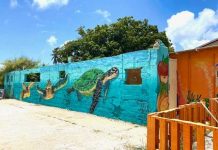MAASTRICHT — Culture and creativity starts at a young age and evolves significantly as we become adults. Today we are going to focus a bit more on the role of education in creating a more cultural aware and creative society.
Over the past months we discussed both socio-economic and cultural developments and their benefits regarding a Cultural and Creative Industry (CCI) implementation on the island. Education was an important element in the overall framework because it provides the means to shape our community and inspire them to appreciate culture and to develop the ability to express creativity in all spectrums of their lives. Following our special series called the Creative Islander “Artist Edition”, where for the upcoming months the Creative Islander will feature students, young professionals and/or creative workers whom are active in the Cultural and Creative scene in Aruba and/or abroad. Today we will learn more about Daylan Krozendijk, who is a senior theatre student at Hogeschool voor de Kunsten Utrecht (HKU). “Choose a study that you really love and you will never feel like you have to learn, but that you want to learn.”
Daylan is a 24 years old Aruban student living in Utrecht, a vibrant multicultural student city in the Netherlands. He is a senior, so this is his last study year part of the Bachelors of Theatre in Education at the HKU. Like many Aruban students who finish high school the decision is difficult in deciding what to study. For some this is easier, but in Daylan’s case after finishing VWO, he studied for one year at the University of Aruba. However, he knew this wasn’t what he wanted for his life and so he took a year off and worked in the meantime. In March of 2015 he took a trip to The Netherlands to audition at the HKU as part of the enrollment procedure of this bachelor. There were two auditions he had to commit to, one in March and one in April and each audition had two rounds. “Out of the approximately 250 students who participated, only 21 were accepted, so the odds were pretty much against me. Luckily I got accepted and now, nearly four years later, I am almost at the finish line”.
Currently, he is working on a play with two children and two students from the Hogeschool van Amsterdam (HvA). Next to this, he also doing an internship at the HvA at the “pabo” where they educate students to become primary school teachers. Daylan’s research is also regarding the way they educate primary school teachers, so it is a perfect combination. Overall, in his free time, Daylan enjoys going to different plays, hanging out with his friends, watch Netflix and play games.
Why did you choose to study what you are studying?
When Daylan was in high school at Colegio Arubano, like all enrolled students he had the opportunity to get art classes in the curriculum. It is there where he started to like the subject of “drama” and to his surprise he was good at it too.
“Due to my interest in the subject my mother came across some local theatre directors on the island who needed actors for their play. It is there where my love for theatre began, but I had always seen it as a hobby, never thought of making a career out of it”. Daylan had been wrestling with his academic choice at this point and it wasn’t until he studied something that he didn’t care for and until he began working on Aruba that he realized how important it is to choose something that makes you happy and that you truly enjoy as a career choice. “Choose a study that you really love and you will never feel like you have to learn, but that you want to learn”. And that’s exactly what I did, and to this day I have no regrets whatsoever with my choice!”
How is it like studying art in The Netherlands?
“Studying the arts in The Netherlands is an amazing experience. It really changed my perspective on a lot of things and opened my mind to think differently and creatively”.
While studying arts at the HKU Daylan got to see and experience a lot of things that are out of the ordinary and that you wouldn’t easily experience if you’re doing any other kind of study. Next to studying, Daylan has acted in plays that really elevated his acting skills and he has seen some plays that have truly showed him what theatre can do to someone or to a whole community when it is treated as a real job and given its place. When talking about theatre it is not only about comedy plays, which most Arubans are used to, but also tragic plays that brings up a certain emotion to the public. Also, politically engaged plays that emphasizes a problem or topic in the society, through which perhaps you can achieve a new perspective on while forming your opinion with diligence.
“Of course it’s not always smooth sailing when doing a study in the arts here in The Netherlands. On one side, they pushed me during my study to think further than the usual convictions of society and they pushed my cultural boundaries of what is allowed and what goes too far. A very simple example of this, is how we see nudity on Aruba. You will almost never find nudity in theatres, plays or performances on Aruba”. Thus, studying art in The Netherlands has allowed Daylan to develop other ideologies and has exposed him to difference.
Do you feel that you personally developed your creative skills and cultural knowledge growing up?
At Colegio Arubano they teach all four art disciplines: dance, drama, music and visual arts. Like I mentioned earlier, Daylan was very much active in participating in plays on the island. These opportunities really helped him to further develop his creative skills while growing up.
“However, I can’t say that this is equally so for all children and teens growing up on Aruba. I know that not all high schools on Aruba want or have the resources to give all four art disciplines for example and drama at primary schools is almost non-existing”. Next to the education Daylan was exposed to at school, his mother and aunt really pushed him to participate in cultural events such as ‘Dia di Betico’ or ‘Dera Gai’ due to their cultural organization ‘Fundacion Mi Cutisa’. “In my case, I had enough input to form my creative skills and cultural knowledge. What I mostly lacked regarding theatre, that I eventually got here in The Netherlands, is the opportunity to witness professional plays on a regular basis”. Nonetheless, when I was growing up, there were simply not enough plays being showed on the island to further learn from them. Something that I fear is still not happening.
Developing a Cultural and Creative Industry on Aruba?
Daylan believes there are lots of benefits in developing a Cultural and Creative Industry on Aruba. It is merely about creating a CCI, because in his eyes the industry is already there, it’s simply a matter of focusing on the parts of the industry that need more development, such as film, television and of course theatre.
“However, I must say that I believe that before we even begin to give form to these areas of the Creative Industry we must first educate our children and the community of the importance of the arts and the importance of this Creative Industry”. For example, how a CCI stimulate new jobs, create more opportunities for many students to return or to go and study something in the arts industry without having the risk of not returning to Aruba. Also, how a CCI can affect our economy by having more creative thinkers in businesses and marketing to further boost their income by attractive marketing. More importantly, this can also have an impact on our tourism by not just selling sandy beaches and fancy dining, but also a cultural experience and getting to know the Aruban culture.
What creative sectors do you feel should be part of the Aruban CCI?
“I believe that all sectors of the CCI should be evenly developed on Aruba. But seeing my background, I firmly think that theatre as a whole, such as; plays, musicals, performances, TV, and film should become a bigger part of the Cultural and Creative Industry on Aruba”.
From a theatrical standpoint, Daylan feels that Aruba can achieve a lot with theatre. Think of for example plays that can educate the Aruban society on worrying topics such as teen pregnancy or alcoholism or by giving training courses in theatre to business people, stimulating their creative thinking for their jobs. The industry can also export plays or musicals, therefore exporting our island’s cultural image to our neighboring islands Curaçao and Bonaire. While we are at it and since on Aruba we can all speak four languages, why not America, Europe and South America. “But again, this can only be done once we start to appreciate the arts for what they are and really seeing the potential that the arts and the Cultural and Creative Industry has within in if given the time, care and resources needed. And this begins in my perspective within education, it’s the future generation that we need stimulate in doing this”.
Do you see differences in creative and cultural developments between The Netherlands and Aruba?
“There are definitely differences between the creative and cultural developments between Aruba and The Netherlands, yet I don’t think that this necessarily means that one is better than the other”.
Daylan feels if we are to compare these two countries with each other, it’s important to perceive things subjectively. In the Netherlands, there is ongoing research being conducted on how to stimulate the arts in the education programs. On an artistic level, theatre groups and cultural organizations gets funds from the government to carry out their projects. However, keeping in mind the size of Aruba and its cultural history, we can conclude that the developments that are going on are also important for the island. If we think of The Aruba Art Fair or Aruba Fashion Week and the fact that more school musicals are being made and presented to the public, “I can surely say that there is positive change being done within the community. Is there room for improvement? Definitely!”
Are creative skills and cultural development important in a child’s upbringing?
During Daylan’s studies in Theatre in Education he has witnessed how important theatre is for the education and upbringing of children.
Especially during their primary school period, the subject “drama” can help children think creatively, understand their emotions, stimulate team work and build up their confidence to stand in front of a group and present something. Thus, Daylan emphasizes that these creative skills are not only important in an educational context, but also crucial in any function one might take in a future job. “Again, I can mostly speak out of a theatrical and educational perspective, but I also know that within the other art disciplines you also learn skills that can have an important contribution for your creative and general development. I also believe that it is important to create a cultural awareness of ourselves and other cultures”. This will result in children understanding their own culture better and that from others. With this, we can learn to love and respect both for what they are and the role they have in our lives.
Do you think creativity is lacking in the Aruban education system?
“I don’t believe that creativity is lacking in the Aruban education system. The creativity is there, it has always been there, it’s just a matter of stimulating this creativity and guiding and bringing out the best of it”.
Daylan feels that Aruba needs to learn to embrace this creativity and optimizing it. This is something that he feels is currently lacking in the education system on Aruba. Let’s take children from ages of 4 to 6 for example. In kindergarten, you constantly see children playing rolls and imitating their parents or important people in our society such as the policeman or firefighters. Ultimately, what they are learning and doing is how to empathize with someone by stepping in their rolls. Knowing this, Daylan suggests that this way teachers can tell stories with moral lessons, while the children act out these roles. This is a simple way to improve drama education for toddlers and by doing so encouraging their creativity, while learning valuable lessons for their future.
What does your future look like?
“After finishing my study, I hope to go back to Aruba and work at the IPA where I can train students who are studying to become primary school teachers.
I’d love to give drama classes to them in the hope that I can inspire them to give drama to their pupils in the future”. Next to this, Daylan also wishes to make theatre plays with different groups of people, amateur children and amateur adults, but also people who already have experience in acting. Daylan can also see himself giving workshops to any group of people, business, students, elderly or anyone who is interested in the theatre and acting.
What tips can you give Aruban students that want to study arts?
“Don’t let anyone or anything demotivate you or influence you in thinking that the arts or any profession in the Creative and Cultural Industry is of lesser importance or that it shouldn’t be taken seriously”.
Daylan expressed that at the end of the day, none of those people are going to be the one delving the books and putting in the hard hours in the study. If you really enjoy the arts and if you are really passionate about something and not only just in the arts, follow that instinct and consider making it your career choice. “Consider this, even when choosing a study that you really love, there will still be certain courses that you will find difficult or that you dislike a bit, imagine if it’s a study that you don’t really want to do. At those times during the study, the only thing that will keep you going is that little fire of passion and love that you have for what you’ve chosen at the start of your journey”.
The Creative Islander congratulates Daylan with the success he has attained thus far and wishes him all the best with his thesis and graduation. Thank you Daylan for sharing your story with Aruba, especially with students who are also considering studying arts or educators who are searching for more creative ways to educate our young ones. All the best going forward Daylan! We hope to hear more from you in the future. q













